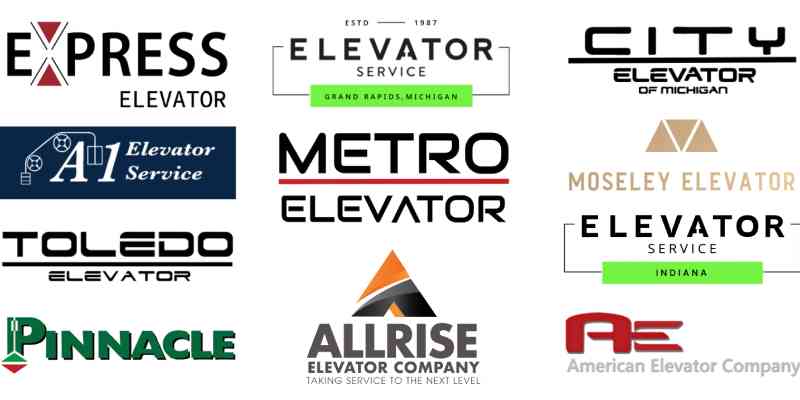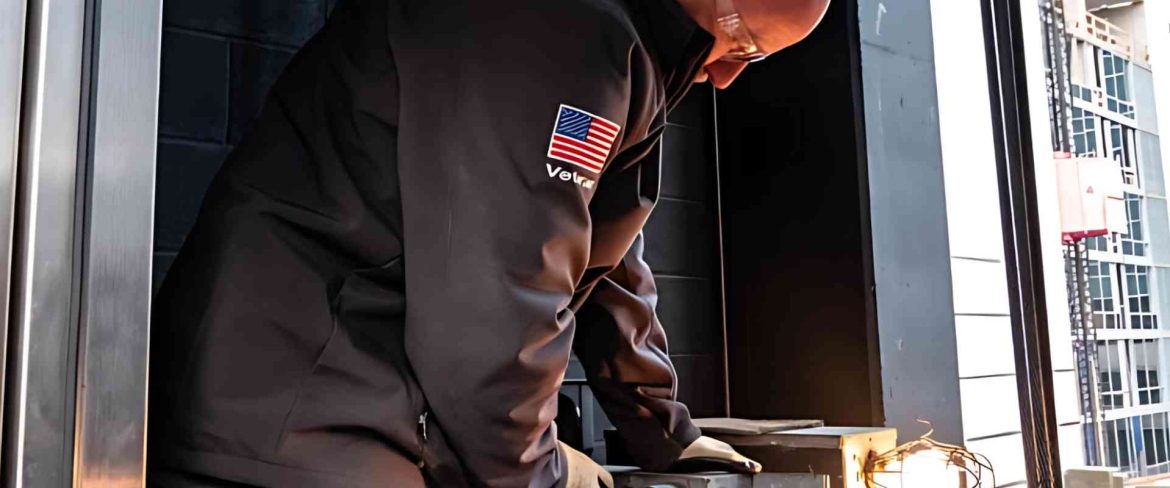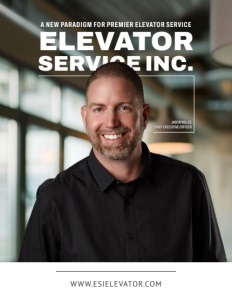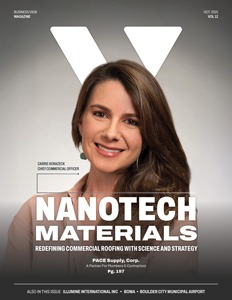A New Paradigm for Premier Elevator Service
A Family of Local Partners Delivering National-Scale Service and Support
What began over 30 years ago as a small, family-owned elevator company in Grand Rapids, Michigan, has transformed into one of the nation’s most robust networks of premier elevator service partners for commercial properties.
This network, now known as Elevator Service Inc. (ESI), has been deliberate in its expansion through strategic acquisitions, which have enabled it to operate with a nimbleness that its larger competitors simply cannot match.
ESI’s growth strategy has effectively redefined its identity, with its leadership viewing it more as a conglomerate that has coalesced around a unified service.
Chief Executive Officer Jason Vallee explains this structure well, saying, “The nice thing about how our company is structured is that we’re a family of independent elevator companies where all of the presidents of the individual companies have full autonomy.”
The company’s operational philosophy follows a brilliant theme of thoughtful centralization, where core functions like safety are standardized while customer-facing operations remain local and personal.
To be specific, the presidents of each local business run their operations as they see fit, while a centralized “platform team” provides crucial support in technology and process.
Additionally, separate from its own network, ESI maintains strong relationships with some of the most well-known and cutting-edge companies in the elevator industry.
Back-end management support from innovative names like Lift AI and durable hardware from reliable manufacturers, such as G&R Custom Elevator Cabs, has been a driving force behind ESI’s high-quality services.
This incredible support, in combination with ESI’s on-the-ground execution, is why its leaders have expressed that the company has had its best year of business since its founding.
As demonstrated by its journey, success for ESI is about more than just expanding its footprint; it’s about becoming a nationwide industry leader without ever sacrificing the local, personal touch that its clients rely on.

Adapting to a Shifting Commercial Landscape
ESI’s unique operational model allows it to be exceptionally nimble, adapting quickly to market changes in ways that more traditional corporate structures often cannot.
This is rather fortunate for the companies in the commercial real estate sector, which ESI predominantly serves, as the company is well-positioned to effectively address some of the most persistent challenges in the sector.
“High financing costs make it difficult for our commercial real estate clients to upgrade equipment. Because repairs to aging systems are also costly, many projects have been delayed or canceled altogether,” Vallee explains.
While major manufacturers may pressure clients to modernize, ESI offers a critical alternative: the willingness and expertise to service older equipment with the skill and care needed to extend its operational life.”
As a service-based business, rather than a manufacturer, ESI can easily pivot to best serve its customers, avoiding supply chain issues or other challenges that might hinder a less agile company.
“We offer a wide range of services- from modernization, new installation, and maintenance services. Our maintenance offerings range from basic oil and grease services, all the way up to full maintenance with 24-hour callback response time. We’re pretty flexible in terms of what type of maintenance we provide our clients,” Vallee states.
In this regard, ESI’s playbook is remarkably consistent, focusing on meeting contractual requirements while maintaining a deep connection to the communities it serves.
ESI’s leaders are adamant about preserving the company’s integrity above all else, ensuring that whatever the company sells, it executes in a way that serves the customer best.
For example, one of the main principles behind the company’s service flexibility is to ensure that clients can reliably select a plan that fits their operating budgets.
Cultivating Talent and a Communicative Mindset
ESI’s flexibility also extends to the pressing issue of under-resourced building engineers and property managers, who are now often responsible for managing multiple properties.
ESI tackles this issue in a very straightforward manner. Our strategy is to invest in our businesses ahead of growth – Communicating with tenants and coordinating all the details can be challenging. One of the ways we overcome that is by ensuring our teams are fully resourced to handle the workload effectively ,” Vallee says.
This strategy prioritizes long-term growth over short-term profits. Being overstaffed allows the company to differentiate from a service perspective, which is why it has scaled so rapidly.
This counterintuitive approach empowers ESI to deliver superior service, with its technicians and customer service teams having the capacity to over-communicate and provide timely, reliable updates to clients.
In one notable example, ESI strategically entered the Fort Wayne, Indiana, market by generously staffing a major project -setting the stage for growth in the market .
Having more resources than needed not only ensured a seamless project but also earned the client’s trust, leading to further business and the establishment of a thriving local office.
ESI’s approach to leadership and talent development is built on the same principle of long-term investment.
Many of the company’s presidents are active members of the Building Owners and Managers Association (BOMA), which facilitates a valuable exchange of information that often yields greater benefits in the future.
“Our local teams are very active in BOMA, and not just for membership but also being on some of the boards as well. It gives us an opportunity to see what’s trending in the commercial real estate business as well as an idea where we can help,” explains President Brett McCay.
By always having qualified elevator inspectors on staff and staying current with the latest codes and regulations, ESI is able to react to any opportunities that arise the moment they do.
This investment in people also applies to the company’s field technicians, as ESI continues to operate maintenance apprenticeship programs —a practice that many competitors have discontinued.
Lastly, ESI also promotes diversity, equity, and inclusion, aligning its practices with the principles of the IUEC.
“Being a multi-regional independent elevator service company gives us diversity in our people. We’re in so many different markets and serve communities with different demographics, so we make it a priority to reflect that diversity in the workforce and in our leadership,” says Director of Marketing Abby Thebeau.
Thebeau also notes that because of its diversity of clientele, ESI also centers itself around engaging in the different communities it serves, as it allows the company “to build a stronger, more inclusive pipeline for the next generation of elevator professionals.”
“Beyond our workforce, our businesses are deeply embedded in the communities we serve,” Thebeau adds. “From supporting local Habitat for Humanity builds to volunteering with regional nonprofits, our teams are committed to giving back in meaningful ways. It’s more than just service—it’s about being a true neighbor and partner in every market.”

Sensible Centralization and Partnerships for a Unified Future
In an industry where new technologies, such as AI and smart building systems, are constantly emerging, ESI’s focus on innovation centers on practicality.
Rather than chasing trends, the company prioritizes adopting tools that are reliable and have a high impact on improving the customer experience. This approach is evident in its ongoing ERP implementation.
“When we do acquisitions, each company we acquire usually has a different legacy system. we’re going through a process right now where we’re streamlining our acquisitions and bringing them all into the same system where we can feed the data to our clients via a customer-facing portal,” Vallee states.
This portal will provide clients with direct access to all their building’s equipment data, enabling them to view uptime and callbacks, as well as pay invoices online.
However, ESI is not a software development company, and as such, it partners with experts to build these high-value tools. In fact, when selecting technology and equipment partners, ESI is equally deliberate in its approach.
“For the products that we use, we only install non-proprietary, universally serviceable products. That way, when we put something in, we put in products that have engineering support for any vendor that might service, whether it’s us or someone else down the road,” McCay clarifies.
This guarantees that once a client has invested with ESI, they have the flexibility to choose any other service provider down the road, as any vendor will be able to service the equipment.
Interestingly enough, one of the biggest challenges ESI faces is a result of its own success: marketing itself as a unified company.
“We’re a collection of independents, and we’ve grown into a fairly large company through our acquisition strategy. We’re now a significant player in the industry. The challenge, from a marketing perspective, is conveying just how big we actually are because all of the companies are individually branded and named in each respective market,” Vallee says.
Because of this, clients with buildings in multiple cities may not realize they can partner with ESI as a single vendor.
To overcome this, ESI’s leadership acknowledges the need for greater marketing and is working to promote its business model.
However, at the same time, they are resisting the temptation to centralize everything within the company.
The company follows a philosophy of ” thoughtful centralization,” unifying what matters most—like safety programs and their new ERP system—while deliberately keeping customer-facing functions, like their local call centers, decentralized.
This ensures that customers can always call their local office and speak with someone they are familiar with.
This hybrid approach is what makes ESI a true disruptor in the industry, and it is the fuel that drives its growth, allowing it to consistently deliver better, faster service to its clients while challenging the status quo.
One thing is certain: Elevator Service Inc.’s unique balance of local autonomy and national-scale support will continue to change how clients view their service partners, carrying this stellar company straight to the top.
AT A GLANCE
Who: Elevator Service Inc. (ESI)
What: One of the nation’s fastest-growing elevator service networks
Where: Headquartered in Grand Rapids, Michigan, ESI operates across multiple regions through a growing network of independent local companies
Website: www.esielevator.com
PREFERRED VENDORS

G&R Custom Elevator Cabs : www.gandrcustomcabs.com
G & R Custom Elevator Cabs is a provider of high quality elevator cabs, interiors and related components. Our experienced sales and engineering team assists regional and national elevator contractors to meet the goals and requirements of any given project, after which our skilled fabricators bring that vision to life.

Lift AI : www.liftai.com
Lift AI modernizes elevator management. Our B2B SaaS turns service records, contracts, and IoT signals into actionable insights. Owners, consultants, and service companies gain transparency, faster decisions, and lower lifecycle costs. From proposals through compliance, we unify data, automate workflows, and surface savings—creating safer, more reliable elevators and accountable operations



